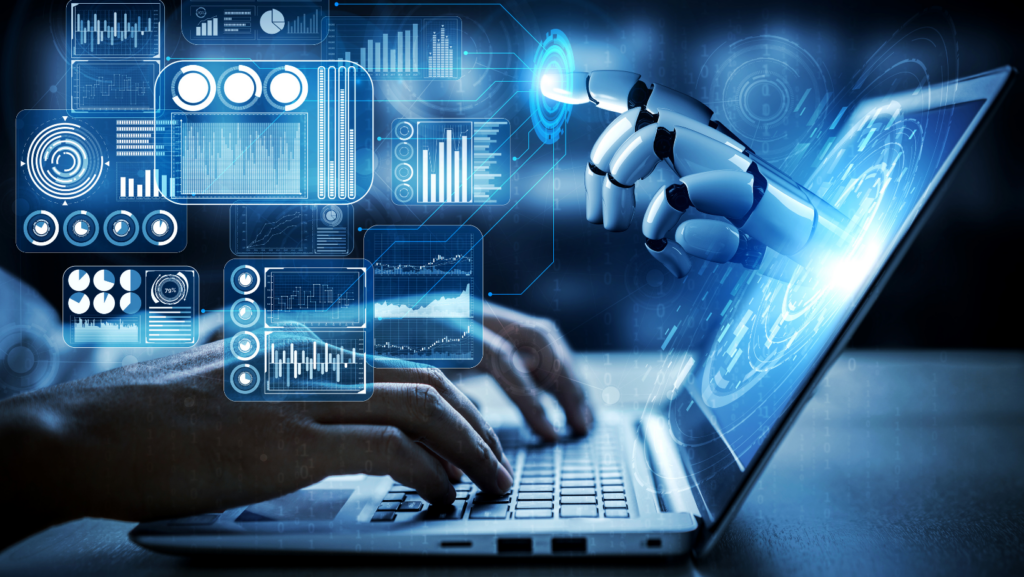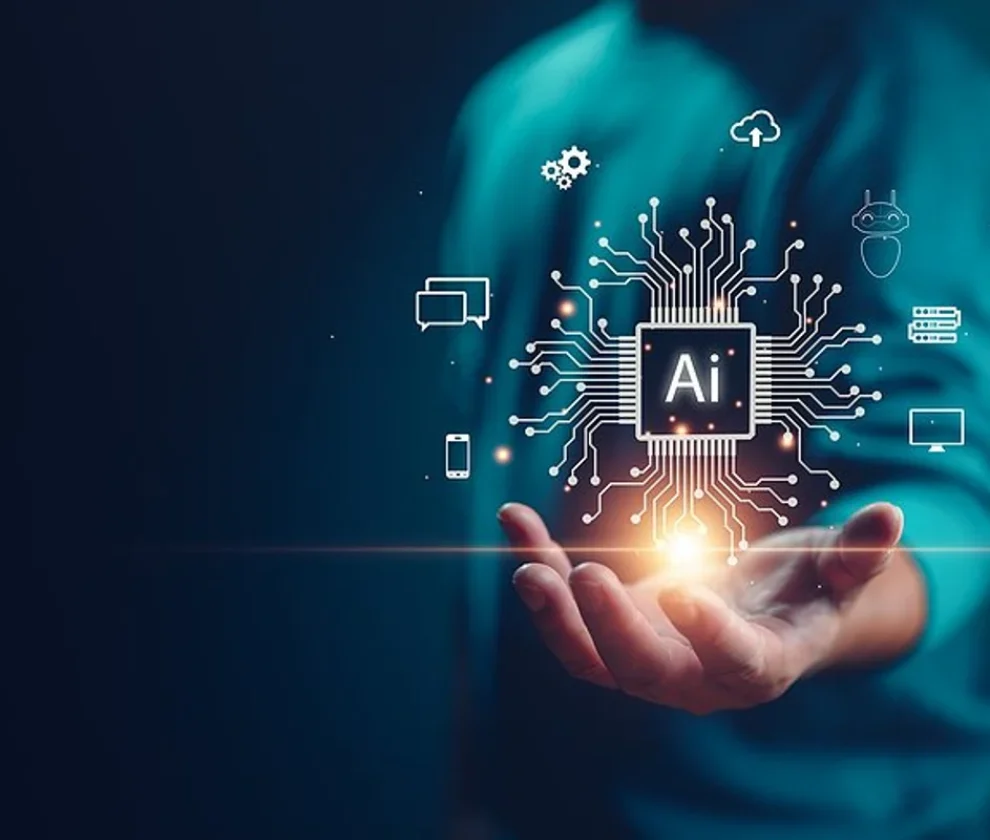The term ‘Artificial Intelligence’ often trips up business leaders in industries which don’t intersect directly with technology. It can invoke images of robots and feelings of machines stealing the jobs of humans. The reality is that AI can help to make their professional and personal lives run more smoothly by removing a lot of the tasks which were previously done manually.
What is AI (Artificial Intelligence)

Artificial intelligence can perform tasks that typically require human intelligence, such as learning, planning and problem-solving. In short, AI is today at the center of business growth.
So, What is AI in Business?
Artificial intelligence in business involves the application of intelligent computer software with human-like capabilities to perform business activities without human involvement.
Why is Artificial Intelligence on the rise in business?
Artificial intelligence (AI) radically transforms how businesses operate, enabling them to automate repetitive tasks, analyze vast amounts of data and make informed decisions. By leveraging AI, businesses can streamline processes, boost productivity and gain a competitive edge.
Artificial intelligence has a wide range of uses in businesses, including generating content, Keyword research, streamlining job processes and aggregating business data.
AI is helping companies and business leaders meet three specific needs, all while saving them time, money and energy. AI can easily automate many business processes, help leaders gain insights through improved data analysis and help businesses better engage with customers and employees. As more use cases arise for how AI can help businesses with these three main tasks and everything that falls within them, the more its use will continue to rise.
If businesses can utilize AI to perform menial tasks they need fewer workers to complete them. If they can use AI to understand which strategies are working and resonating with their clients and consumers, they can spend less money on advertising and guessing games with clear data to back up success. They can also better analyze more data to prevent future failures and wasted spends.
How does AI help businesses?
AI enables businesses to improve customer experience, boost revenue, increase productivity and efficiency and drive business growth and transformation. How?
Business processes today have a high level of complexity involving large amounts of data. With vast data, companies can obtain valuable insights to build growth strategies.
Using AI in business, companies can analyze vast amounts of data quickly and in real-time and get actionable insights for better decision-making. This enables businesses to understand and engage customers, automate business processes and improve productivity and revenue while reducing operational expenses.
How Does AI in Business Work?

AI systems work by consuming large data quantities (training data), analyzing the data for correlations and patterns, and using these patterns to predict future states. AI is an interdisciplinary category of computer science with multiple approaches and advancements in key technologies or AI techniques, which include the following:
- Machine Learning (ML): Machine learning (ML) is a subset of AI that involves developing algorithms and models that enable computer systems to learn and make predictions or decisions. It involves developing techniques that automatically allow computers (machines) to learn from data and improve their performance over time. ML algorithms analyze and extract patterns from large datasets to make predictions or take actions based on new inputs.
- Deep Learning (DL): Deep learning is a more advanced type of ML that works through representation but with unstructured data sets. It uses biologically inspired artificial neural network architecture. DL is inspired by the structure and function of the human brain’s neural networks. Deep learning algorithms have supported image and speech recognition and NLP tasks.
- Natural Language Processing (NLP): In AI, Natural Language Processing is a linguistic tool in computer science that enables machines to learn, read, understand, interpret, generate and respond to human language. NLP techniques are used in various applications, such as machine translation, sentiment analysis, chatbots and voice assistants.
- Computer Vision (CV): Machine vision (computer vision) is an area in AI that enables computerized machines to understand and interpret visual information from images or videos. Applications of machine vision techniques include object recognition, image classification, video surveillance, autonomous vehicles, medical imaging and others.
What are some Artificial Intelligence uses in businesses, and how does AI impact efficiency?
Businesses can utilize AI tools to employ ‘smart building’ techniques to track the energy usage of their offices for improved efficiency.
AI has become ubiquitous in various aspects of business operations. The use of AI in business operations and applications is expanding. Some of the most common use cases include:
1. Data analytics and business intelligence
With the increasing amount of available business data, finding insights from the data can be quite challenging. This is why many businesses are adopting AI in business intelligence. AI enables organizations to analyze large data volumes and extract valuable insights quickly. These insights help businesses identify trends, make data-driven decisions, and optimize processes. For example, businesses can use AI data to improve marketing, understand customers better, perform segmentation and create personalized experiences.
2. Customer service, experience and support
One of the most common enterprise use cases for AI is in customer experience, service and support. Though still controversial, AI is increasingly replacing humans in customer service. AI-powered technologies such as chatbots, virtual assistants and personalized recommendation systems enhance customer interactions. They provide instant support, tailored recommendations and personalized experiences, leading to higher customer satisfaction and loyalty.
3. Personalized and targeted marketing with predictive modeling
Targeted marketing is a key application of AI in business. AI algorithms can predict future outcomes based on historical data, allowing businesses to anticipate customer behavior, demand trends and potential risks. This enables proactive decision-making and resource allocation. For example, online search providers, retailers and other internet entities use AI intelligent systems to understand users and their buying patterns.
4. Natural language processing (NLP)
With AI, machines can now read, write and understand languages like humans. AI-powered chatbots and virtual assistants can understand and respond to human language, providing personalized customer support and enhancing user experiences. With advancements in NLP, businesses now offer smart digital assistant products to assist users in routine tasks. These NLP softwares now helps businesses to generate automated business reports without human supervision. They can also conduct sentiment analysis to understand people’s perception of brands from various sources such as online comments, tweets, etc.
5. Predictive analytics and product recommendations
To increase marketing effectiveness and customer engagement, businesses recommend products that retain customers’ interest and satisfy their desires. Companies like Spotify, Amazon, Netflix, etc., are using AI to understand their customers’ habits/behaviors to predict and recommend products.
6. Documentation and Knowledge Base Building
With no code tools, process documentation and building company knowledge bases is now easier. Scribe, for example, allows you to capture your screen and automatically create how-to guides easily. No code tools also provide adequate cloud document storage and sharing. And with ChatGPT, companies can automate the entire documentation process for documents like standard SOPS, FAQs, training modules, etc.
5 Real-life examples of AI in business
Here are examples of artificial intelligence in business examples:
1. Transportation
There are many ways AI is being applied in transportation businesses, including the following:
- Taxi-hailing apps like Uber leverage AI to predict demand and traffic, reduce estimated arrival time and match riders and drivers.
- Maps use AI navigational systems to improve transport and navigation while providing directions and enhancing traffic detection.
- Self-driving cars like Tesla use AI algorithms to navigate roads and make decisions.
2. Recommendations on Netflix, YouTube and Spotify
Netflix, Spotify, YouTube and other streaming services use a user’s watch or search history to recommend what to watch based on the user’s listening or viewing history. This helps provide personalized content to improve customer experience and satisfaction.
3. AI in Healthcare
Healthcare organizations are leveraging AI for medical image analysis. Medical companies use deep learning algorithms to analyze medical images, helping radiologists detect abnormalities and diagnose diseases more accurately. This improves patient care and reduces the time and effort required for diagnosis. An example is Healthcare BPO.
4. eCommerce platforms
Amazon, Alibaba and other eCommerce platforms integrate AI into their platform to enhance customer experiences. Their recommendation engine uses ML algorithms to analyze user browsing and purchase history, providing personalized product recommendations that increase customer engagement and drive sales.
5. Content creation
Tools like Document 360, Scribe, etc. use a generative AI to help businesses document processes. Businesses can document and share processes, SOPs, FAQs, manaus, etc.
Artificial intelligence (AI) has a wide range of benefits and uses in business, including:
- Improving the customer experience
- Automating business processes
- Gaining insight through data analysis
- Streamlining job processes
- Aggregating business data
- Turning data into actionable insights
- Increasing leads by more than 50%
- Reducing call time by 60-70%
- Boosting efficiency through process automation
- Improving the speed or consistency of service
According to a study by Harvard Business Review, companies using AI for sales can increase their leads by more than 50% and reduce call time by 60-70%.
Moreover, 61% of companies use AI to optimize emails, while 55% deploy AI for personalized services, such as product recommendations. Businesses also leverage AI for long-form written content, such as website copy (42%) and personalized advertising (46%).
Artificial Intelligence impact on business will be long-term
Artificial Intelligence in business and its use cases are virtually endless. AI in business will continue to grow and be adopted by nearly every company in every industry. That might seem like a bold statement, but its use cases apply to so many manual tasks that affect our professional and daily lives. Not using AI in business will only put professionals at a disadvantage as their competitors who utilize it will continue to save time and resources.
AI technology in business will only help companies to streamline their communication both internally and externally, and communication is essential during these unprecedented times with the need for social distancing. Artificial intelligence and business will continue to work together hand-in-hand.
Conclusion
Artificial intelligence has become a powerful tool for businesses across various industries.
From data analytics, predictive modeling and natural language processing to generative AI, businesses are using AI to automate tasks, improve efficiency and enhance decision-making.
Artificial intelligence is increasingly becoming crucial for organizations in their digital transformation journey. More organizations are either using or exploring AI. Further, AI rollout has accelerated as a result of the COVID-19 pandemic.


